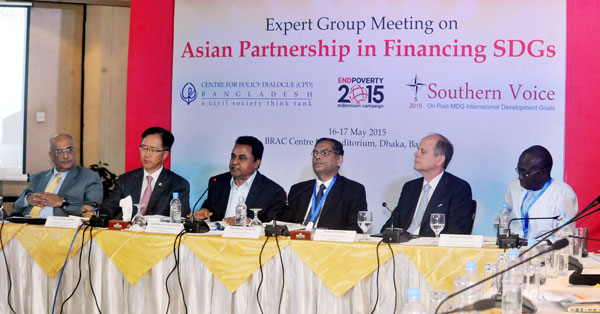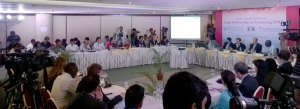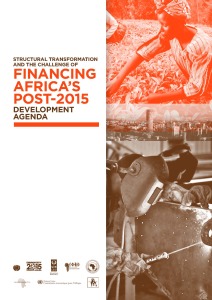Expert Group Meeting on
Asian Partnership in Financing SDGs
organised by Centre for Policy Dialogue (CPD), Southern Voice (SV)
in partnership with the UN Millennium Campaign
Dhaka: 16-17 May 2015

Countries in South Asia and South East Asia have shifted reliance from overseas development aid (ODA) to domestic resources for financing development but yet to strengthen their institutional frameworks for coordination.
Bangladesh needs to enhance focus on revenue generation, FDI, private investment, remittance, export and intra-regional trade for financing development in the evolving scenario.
The observations emerged from the opening session of the Expert Group Meeting on Asian Partnership in Financing SDGs organised by Centre for Policy Dialogue (CPD), Southern Voice (SV) in partnership with the UN Millennium Campaign at Brac Centre Inn, Dhaka on 16 May 2015.
Following welcome remarks from CPD Executive Director Professor Mustafizur Rahman, Chair and Moderator of the session, Mr Sering Falu Njie, Deputy Director, Policy, UN Millennium Campaign, anticipated that the EGM would come up with viable suggestions for financing the development agenda which would feed the upcoming third conference on Financing for Development (FfD) to be held in Addis Ababa in July 2015.
In the keynote presentation, Dr Debapriya Bhattacharya, Chair, Southern Voice and Distinguished Fellow, CPD examined aspects of the financing for development initiative in the Asian context, focusing on South and South-East Asian countries between 2000 and 2013.
Press reports on the event
Opening Session: Global Partnership for Financing Post-2015 Agenda in Asia: An Analysis of Trends and Framework Issues [Executive Summary] by Debapriya Bhattacharya and Mohammad Afshar Ali
Working Session 1: Financing Public-Private Partnership in Infrastructure: An Asian Perspective
by Simrit Kaur
Working Session 2: Economic Role of Remittances in Financing SDGs in Asia
by Alvin P. Ang
Working Session 3: Delivering on Data Needs for Monitoring SDGs: Addressing Financing Issues in Asia-Pacific Context
by Mustafizur Rahman, Towfiqul Islam Khan, Mostafa Amir Sabbih, Shahida Pervin
He recommended developing a regional monitoring mechanism and an accountability framework to track progress of the SDGs and harmonise the ongoing efforts in financing for development.
Guest of Honour H E Mr Lee Yun-young, Ambassador, Embassy of the Republic of Korea in Bangladesh shared the Korean experience of increasing domestic resource mobilisation and self-reliance in the post-war period.
Mr Robert Watkins, UN Resident Coordinator and UNDP Resident Representative in Bangladesh addressing as the Special Guest and Mr A H M Mustafa Kamal, MP, Hon’ble Minister for Planning, Government of Bangladesh addressed as the Chief Guest. They emphasised developing domestic human resource, generate employment and enhance intra-regional trade and regional cooperation.
Among other Discussants, Mr Arastoo Khan, Member, Physical Infrastructure Division, Planning Commission observed that the government has favoured increasing private sector investment and the reliance for financing is shifting from ODA to domestic revenue mobilisation.
According to Dr Sultan Hafeez Rahman, Executive Director, BRAC Institute of Governance and Development (BIGD), domestic private investment, FDI would play the most crucial role for financing development. He also observed that contexts in developing countries have changed and it is much harder to make them accept things they do not necessarily find relevant to their interests.
Another Discussant, Mr Salman Zaidi, Poverty Global Practice Manager, East Asia and Pacific Region, The World Bank noted that ways for backing the SDGs in country context should include crowding finance from private sector, putting focus on PPPs, investing in data etc.
Dr Simrit Kaur, Professor of Public Policy at University of Delhi noted that South Asians are high on savings and ways should be explored to mobilise the savings for financing.
Mr Asif Ibrahim, Former President, DCCI, urged to scale up public finances and a change in mindset to invest in green businesses. Bangladesh needs access to green funds at a very affordable rate, he added.
Ms Argentina Matavel Piccin, Country Representative, UNFPA felt that financing should be people-centric and the focus should be on its utilisation. She emphasised investment in youth, women and health and human resource.
The floor discussion was also addressed by H E Mr Johan Frisell, Ambassador, Embassy of Sweden; Mr M Syeduzzaman, Former Finance Minister; Dr Milindo Chakrabarti, Visiting Fellow, RIS, New Delhi; Ms Jennifer del Rosario-Malonzo, Manager, IBON International, Philippines; Ms Hagar Russ, Child Rights Governance Director, Save the Children; Muhammad Alkama Siddiqui, Additional Secretary, Economic Relations Division; among others.
Background
One of the major weaknesses of the Millennium Development Goals (MDGs) was the lack of clarity in specifying the availability of financing and other resources to achieve the declared objectives. The final outcome document of the Open Working Group (OWG) on the post-2015 international development goals has thus rightly included the Means of Implementation (MoI) as an important item of the Sustainable Development Goals (SDGs). In connection with the preparation for the upcoming third conference on Financing for Development (FfD) to be held in Addis Ababa (July 2015), discussion on issues related to financing are gathering momentum. In this context the relationship between the SDG and FfD processes are being clarified and the level of ambition of the outcome FfD document is being tested. Discussions are underway to identify specific financial and other needs of different groups of countries including their regional priorities.
The EGM
In this context an expert group meeting (EGM) titled “Asian Partnership on Financing SDGs” is being convened by the Centre for Policy Dialogue (CPD) in collaboration with Southern Voice (SV) on Post-2015 International Development Goals (Southern Voice) and in partnership with the UN Millennium Campaign. The EGM is scheduled to take place in Dhaka on 16-17 May 2015.
Objectives
The prime objective of the EGM will be to explore the possible sources of finance and other means of implementation of the SDGs in the Asian context. The EGM will also try to assess the relevance of Busan process for improving the effectiveness of the financial flows in Asia. Concretely, the EGM will consider a regional framework paper and three thematic papers prepared for the meeting. The outcome of the EGM will feed into an integrated report (along with African perspectives) which will be disseminated at the FfD Conference in Addis Ababa.
Resources
As mentioned, the EGM will discuss a framework paper on financial and trade flows in Asia and provide an outlook for the FfD Conference.
The thematic studies, will focus on the following:
- The Asian Experience on Public Private Partnership (PPP)
- Role of Overseas Remittances in Promoting Growth and Alleviating Poverty in Asia
- Financing Data and Information Needs for Monitoring and Accountability Mechanism of the Post-2015 Agenda
The thematic papers will present cross-country perspectives in the context of post-2015 development agenda. Researchers with expertise in the abovementioned subjects from three different Asian countries will be approached to write the papers.
Outcome
The outcome of the EGM will be a set of summary and recommendations based on the proceedings. The outcome document will be subsequently integrated into a fuller report to be presented at a side event at the FfD Conference.
Participants
The EGM will be attended by about 15 participants. They will include the authors of the framework paper and the three thematic papers. A group of scholars and policy activists from the region along with government officials, development partners will be invited to the EGM. The proceedings will remain open to media.
Programme
|
DAY 1: Saturday, 16 May 2015 |
|
9.30 am-12.30 pm |
Opening Session |
|
|
Dialogue on Framework Issues for Asian Partnership in Financing SDGs |
|
9.30 am-9.35 am |
Chair Professor Mustafizur Rahman |
|
9.35 am-9.45 am |
Introductory Statement |
|
9.45 am-10.05 am |
Framework Presentation Dr Debapriya Bhattacharya |
|
10.05 am-10.35 am |
Discussants Mr Arastoo Khan |
|
|
Mr Salman Zaidi |
|
|
Dr Sultan Hafeez Rahman |
|
10.35 am-11.35 am |
Open Discussion |
|
11.35 am-11.50 am |
Guest of Honour H E Mr Lee Yun-young |
|
11.50 am-12.05 pm |
Special Guest Mr Robert Watkins |
|
12.05 pm-12.20 pm |
Chief Guest Mr A H M Mustafa Kamal, MP |
|
12.20 pm-12.30 pm |
Closing Remarks by the Chair |
Working Session 1
|
1.30 pm-3.20 pm |
Public-Private Partnership (PPP): The Asian Experience
|
|
1.30 pm-1.35 pm |
Chair Ms Kallayaphorn Jasmine Jaruphand |
|
1.35 pm-1.55 pm |
Presentation Financing Public Private Partnership in Infrastructure: An Asian Perspective Dr Simrit Kaur |
|
1.55 pm-2.15 pm |
Discussants Mr H K Yong
|
|
2.15 pm-3.00 pm |
Open Discussion |
|
3.00 pm-3.15 pm |
Guest of Honour Mr Mahbub Ahmed |
|
3.15 pm-3.20 pm |
Closing Remarks by the Chair |
Working Session 2
|
3.30 pm-5.20 pm |
Role of Overseas Remittances in Promoting Growth and Alleviating Poverty in Asia Rapporteur: Dr Dushni Weerakoon, Deputy Director and Head of Macroeconomic |
|
3.30 pm-3.35 pm |
Chair Dr Posh Raj Pandey |
|
3.35 pm-3.55 pm |
Presentation Economic Role of remittances in Financing the SDGs in Asia Dr Alvin P. Ang |
|
3.55 pm-4. 15pm |
Discussants Dr Tasneem Siddiqui
|
|
4.15 pm-5.00 pm |
Open Discussion |
|
5.00 pm-5.15 pm |
Guest of Honour Mr Md Shahidul Haque |
|
5.15 pm-5.20 pm |
Closing Remarks by the Chair |
|
DAY 2: Sunday, 17 May 2015 |
Working Session 3
|
9.30 am-11.20 am |
Financing Data and Information Needs for Monitoring and Accountability Mechanism of the Post-2015 Agenda Rapporteur: Dr Vaqar Ahmed, Deputy Executive Director, Sustainable Development |
|
9.30 am-9.35 am |
Chair Dr Milindo Chakrabarti |
|
9.35 am-9.55 am |
Presention Delivering on Data Needs for Monitoring SDGs: Addressing Financing Issues in Asia-Pacific Context Mr Towfiqul Islam Khan |
|
9.55 am-10.15 am |
Discussants Dr Stuart Davies Mr Abhishek Kumar |
|
10.15 am-11.00 am |
Open Discussion |
|
11.00 am-11.15 am |
Guest of Honour Dr Shamsul Alam |
|
11.15 am-11.20 am |
Closing Remarks by the Chair |
Closing Session
|
11.30 am-1.00 pm |
Wrap-up Discussion |
|
11.30 am-11.35 am |
Chair Professor Mustafizur Rahman |
|
11.35 am-12.00 pm |
Rapporteurs’ Presentations Session 1: Ms Jennifer del Rosario-Malonzo |
|
12.00 pm-12.20 pm |
Reflections by Mr Sering Falu Njie
|
|
12.20 pm-12.50 pm |
Open Discussion |
|
12.50 pm-01.00 pm |
Concluding Remarks by the Chair |
This paper is a synthesis of deliberations by a gathering of African thinkers, parliamentarians and civil society organisations, hosted by the Pan-African Parliament based in Midrand, South Africa.
In the African context this has to be underpinned by developmental/structural transformation and this process should in turn inform the approach taken to issues of governance (developmental governance), financing, global developmental partnerships, and any socio-economic development goals and tar gets that are internationally agreed.
DownloadOpening Session
Closing Session





